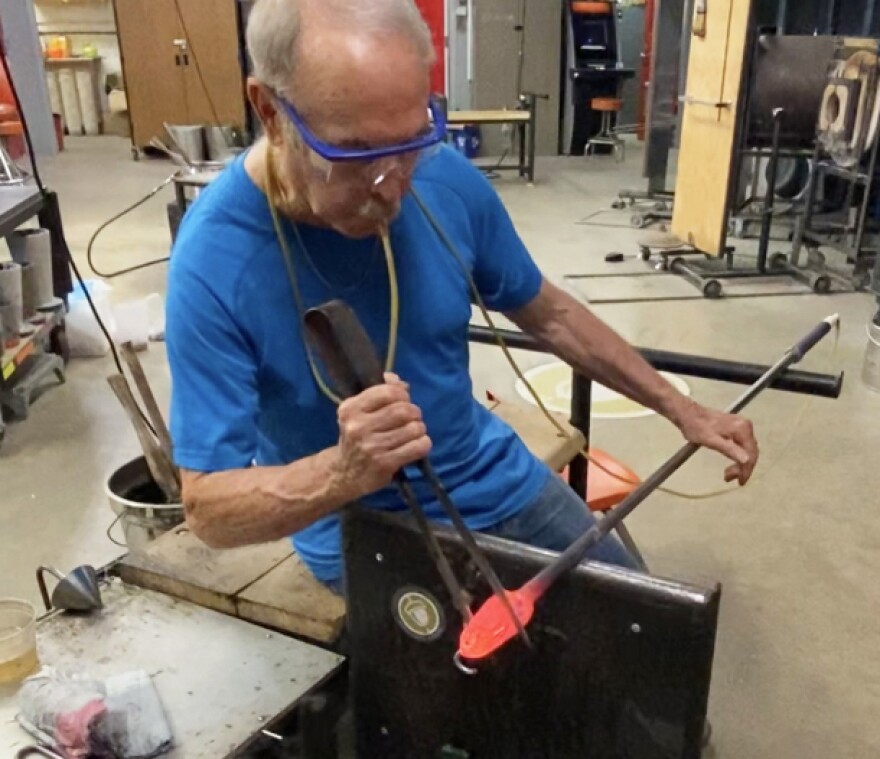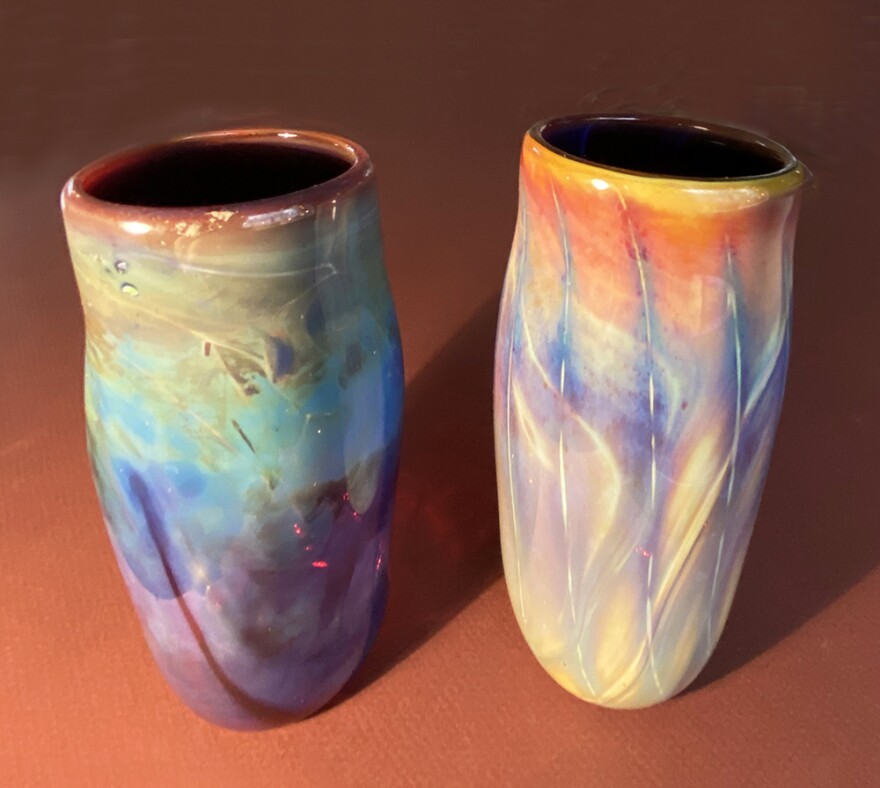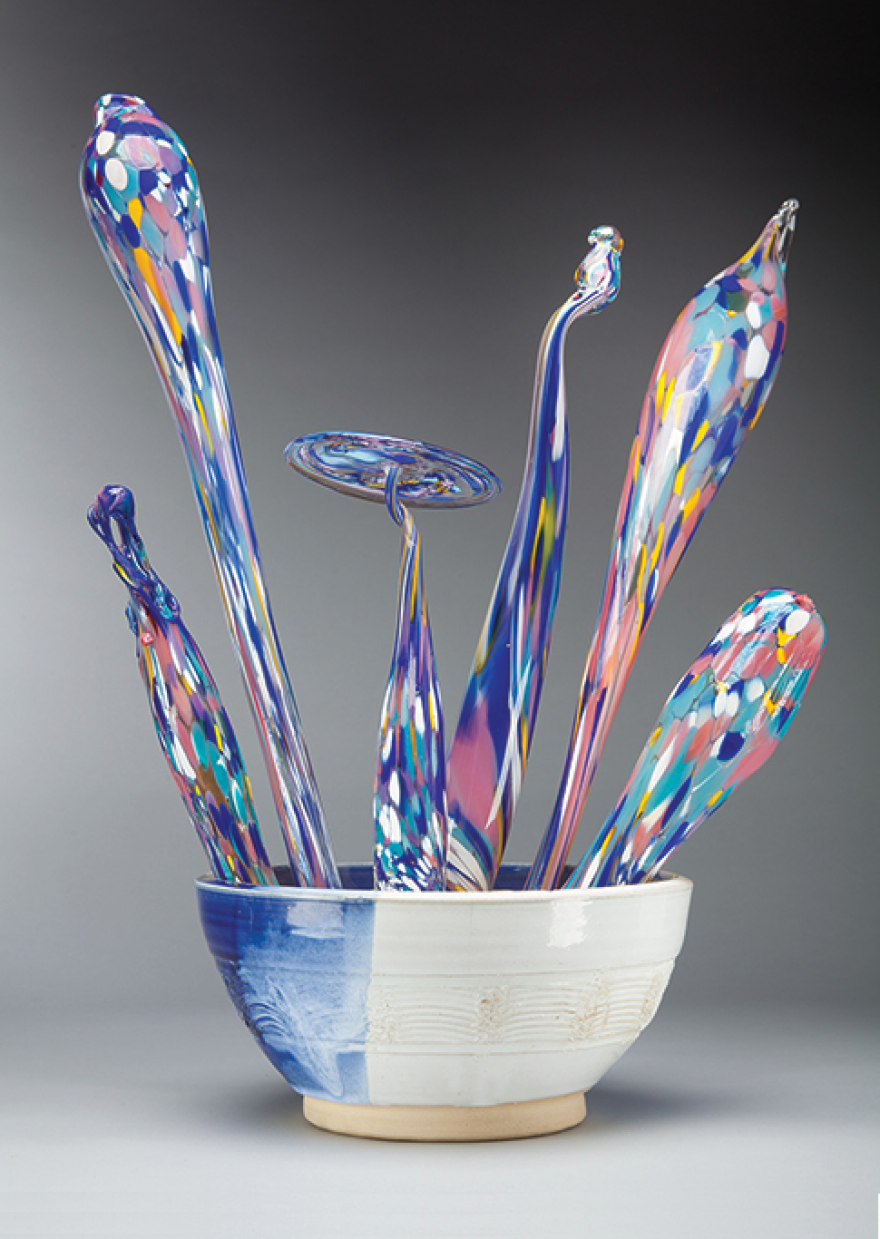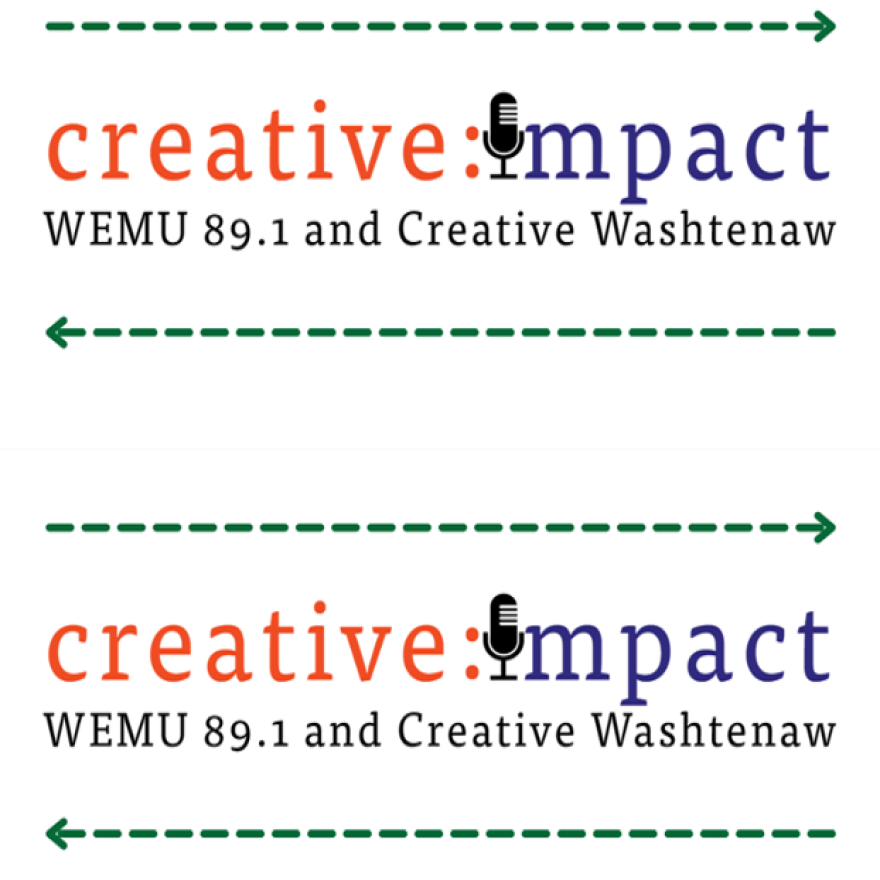Creative industries in Washtenaw County add hundreds of millions of dollars to the local economy. In the weeks and months to come, host Deb Polich, the President and CEO of Creative Washtenaw, explores the myriad of contributors that make up the creative sector in Washtenaw County.

ABOUT LARRY NISSON:

Larry Nisson has been working artistically with glass for over forty years. He started as a stained glass artist and then became involved in glass blowing and glass sculpting. Larry enjoys the fact that he needs to be totally present to make the process work to his satisfaction. He loves the way colors, glass and light mix together to create a pleasurable visual and kinesthetic experience for the viewer. He finds glass art to be constantly challenging as well as extremely gratifying. In glass blowing and sculpting, the glass is his partner and he has to follow as well as lead.
The majority of glass artists work with assistants who can bring them tools or additional heat that make it easier to work with hot glass. Larry prefers the experience of working alone as he feels more connected to the glass doing so. It also requires him to work quickly, but at the same time, be relaxed enough that he can flow in partnership with the glass regarding the shapes that he creates. The heat is usually different for each piece so he has to adjust what he wants to do with what the glass is willing to do. Sometimes, the hot glass ends up on the floor and other times, he can move with the glass in ways that create real beauty.
Larry’s work has been on the desk of one of Michigan’s governors as well as owned by numerous glass art collectors.
Larry’s glass art has been displayed by:
- Kubiak Gallery in Douglas, MI,
- The Manheim Gallery in Cottonwood, AZ
- Ann Arbor Art Center
- WSG Gallery in Ann Arbor, MI
- Water Street Gallery in Douglas, MI
- Selo Shevel in Ann Arbor, MI
RESOURCES:
TRANSCRIPTION:
Deb Polich: Welcome to creative:impact on 89 one WEMU. Thanks for tuning in on Tuesdays to meet creative guests deeply rooted in Washtenaw County, and I'm glad you're joining me, your creative:impact host, president and CEO of Creative Washtenaw. And together we're going to discover how their work, business products, programs, and services impact and add to our local quality of life, place, and economy. Our guest today, Larry Nisson, like so many other creative people in our community and elsewhere, has balanced his vocation with his advocation. He's a business owner and a glassmaker. He and his wife Lucie have added community arts to their portfolio as they champion events and projects all over town. Let's meet Larry to learn more. Larry, welcome to creative:impact.
Larry Nisson: Thanks for having me.
Deb Polich: So, we're glad you're here. And I want to focus on your glassmaking. But what I want to do first is maybe have you give a quick overview of what has drawn your attention and has filled your time during your life here in Ann Arbor.
Larry Nisson: Well, artistically, I found glass. Well, I started with stained glass many years ago, and I did that for a number of years. And then I Googled glass blowing one day about 18, 19 years ago. It was a hot August day. And I went to a studio in Ypsilanti called Baron Glassworks. It's no longer there. It was run by a woman, Annette Baron, and it was incredibly hot. And I went in, and I had a private lesson. She had me wear an ice vest because it was so hot. And I walked away thinking, "I want to do more of this." And so, I just kept doing it. And glassblowing is a really hard thing to learn how to do because you're working with glass that's 2000 degrees. It's liquid when you get it out of the oven. It's very challengingm and I like that. But it was also difficult, so I just stuck with it and kept working on it and working on it. And I love the fact that I could create beautiful things, but also, I could create a lot of functional things. I love making what I call gratitude glasses--glasses that you drink out of when you think about what you're grateful for. I make glass flowers, I make yard art--so, a lot of things that are very functional as well as beautiful. And so, the fact that Ann Arbor--well, Ypsilanti actually--had a glassblowing studio was a real gift to me.

Deb Polich: Yeah, well, I've never heard of an ice vest before, so I have to check that out. And where are you creating glass now since the Ypsilanti studio is closed?
Larry Nisson: Now. Yeah, they closed. I'm working at Acorn Glassworks in Plymouth, Michigan. It's a very well-run studio by a gentleman named Phil Yamron. And I go a couple of times a week, and I rent studio time, which allows me to go in. And I work on my own. Many glass artists have assistants, and they work in groups. But I found that I really like being able to work with myself. It's very meditative. I can lose myself in the process, and it's a very special experience for me when I go in the studio.
Deb Polich: So, you know, glass is one of my favorite mediums, and although I've never tried to make anything, I really love watching how it goes from fluid to, you know, create something really beautiful and functional and decorative. But I mostly love how glass captures and refracts the light. You know, watching a glassmaker is mesmerizing, but I'm also really always anxious for them because I wonder if they're going to get burned or drop the glass after working on something so hard. Does that happen?
Larry Nisson: Well, I've been blowing glass for about eighteen years. I burned myself once, and it wasn't very serious. But I'm always dropping and breaking stuff. That's just part of the process. That's one of the challenges. As a glassblower, you have to let it be okay that whatever happens is done and then you keep moving forward. That was one of the biggest challenges, really, because glass does break, especially in the beginning.
Deb Polich: Sure.

Larry Nisson: You'll make a piece, or you'll make a piece, and you think that it's fine and you put it in the annealer, and you take it out. The other day I had this beautiful glass. I could just tell it was going to be gorgeous. And so, I put it in the annealer, and I got through the day--
Deb Polich: Wait, wait, wait. Tell us what's an annealer?
Larry Nisson: Okay. An annealer is when you take the glass and you're done working on it, and it's solid enough to be put away. You put it into an annealer, which starts out at about 900 degrees, and then it goes down 50 degrees an hour until it gets to zero. If you just finished your glass piece and left it out, it would crack.
Deb Polich: Right.
Larry Nisson: The annealer is what you put it in. And the annealer is interesting because when you go to the studio after working, it's like Christmas morning each time because you open your annealer, and you get a surprise. You get a present. And mostly, the presents are functional, and they're together. But the other day this one broke. So, I opened it, and there is my cracked glass there. But, you know, that's part of the process.
Deb Polich: And do you really respond to it with a "Oh, well. That's how it goes." Or is there just a moment of loss?

Larry Nisson: Pretty much, nah. I've had to work on this. And, of course, I'm disappointed. I mean, it's natural to be disappointed when you have something that you want to work out, and it doesn't. But then, it's, like, part of the process. You just accept it, and you try and make another one.
Deb Polich: Well, and I'm sure that there's always that, you know, "Okay, next time," almost like, you know, "Let's wait for next season" kind of thing. 89 one WEMU's creative:impact continues. I'm your host, Deb Polich, and my guest is local glass artist Larry Nisson. You know, I once had the pleasure of visiting Dale Chihuly's studio. And, you know, he's recognized widely as the artist that moved glass and studio glass into the realm of fine art. And what I found really beautiful was how he had a team. You talked about you're a solo artist, but a team of artisans who worked together making a piece. And it was like watching a choreographed dance with humans using fire, molten glass, and many tools. When you're in the studio, are there other people there? I know you said you work solo, but are there other people working?
Larry Nisson: No, I'm actually...well, the owner of the studio, Philip Yamron, he's many times there. He's keeping the studio running. But there's usually never any other glassblower, so I'm the only glassblower in the studio.
Deb Polich: So, glassblowing is a second career for you, maybe a side gig, or one of your jams now. But you also are a successful businessperson. How does really putting focus on being an artist? What difference has that made for you?

Larry Nisson: Well, actually, I was a psychotherapist for many years, and I was also a real estate investor owning real estate. And those were both...well, the therapy was about interpersonal, and the business was...uh, it wasn't as creative. I guess that's what I would say. The thing I like about glass is that it's very creative. Real estate was just solving problems, solving problems, solving problems. And they weren't always fun problems to solve.
Deb Polich: Sure.
Larry Nisson: Now, I have a property manager. My son's mother-in-law manages our property, so I don't have to think about real estate. And I'm glad because art is a lot more fun than real estate. I guess some people like real estate. But I've done it all, and I'm done with that and therapy.
Deb Polich: Wow, that's great. So, extending the subject slightly, you and your wife Lucie have initiated many community arts and public initiatives. A number of Ann Arbor's downtown murals exist because of your leadership and support, and you've been involved with the West Side Art Hop, and you've even helped Creative Washtenaw experiment with some creative programs, some that, let's just say, maybe, they broke, but you let us experiment with them. So, we appreciate that. Maybe this comes from glassblowing. So, what inspires you and Lucie to work on that in a bigger picture?

Larry Nisson: Well, I think what it is, is there's so much negativity in the world that we believe the best way to deal with it is to do what you can to increase the positivity in the world. And beautiful art or expressive art is a way to do that. So, it's a way to give back. And we also like to create with other people and see what we could do to make something beautiful. So, you take a space that is plain, you put a mural, and suddenly, it's beautiful. And everybody can enjoy it. I remember, one day, I was looking for mural spots. And this couple came up to me. They were pushing a cart with all their belongings. They said, "What are you looking at?" I said, "I'm looking for a place to put more murals." And the woman said, "Are you involved with this?" And I said, "Yeah." She said, "Well, thank you. I love walking around downtown, seeing what new murals up and looking at the murals and seeing something new in the mural that I didn't see before." And her boyfriend said, "Yeah, I love looking at this one mural and trying to figure out what it means." And so, it was really nice. Everybody gets to enjoy art no matter, you know, their financial situation, and the world needs more positivity. And so, Lucie and I do what we can to add to it.
Deb Polich: Well, I've got to give thanks for the community to you and Lucie and for your work individually as artists for increasing the positive energy that we have here in Washtenaw County. Thanks so much for being on the show.
Larry Nisson: It was a pleasure talking to you.

Deb Polich: That's Larry Nisson, glass artist and, with his wife, Lucie, creative catalyst in our community. Find out more about Lucie and see some of his glasswork at WEMU dot org. You've been listening to creative:impact. I'm Deb Polich, president and CEO of Creative Washtenaw and your host. Mat Hopson is our producer. Join us every Tuesday to meet another creative Washtenaw guest. Celebrating 45 years of jazz broadcasting, this is 89 one WEMU FM Ypsilanti. Public Radio from Eastern Michigan University.

Non-commercial, fact based reporting is made possible by your financial support. Make your donation to WEMU today to keep your community NPR station thriving.
Like 89.1 WEMU on Facebook and follow us on Twitter
Contact WEMU News at 734.487.3363 or email us at studio@wemu.org







